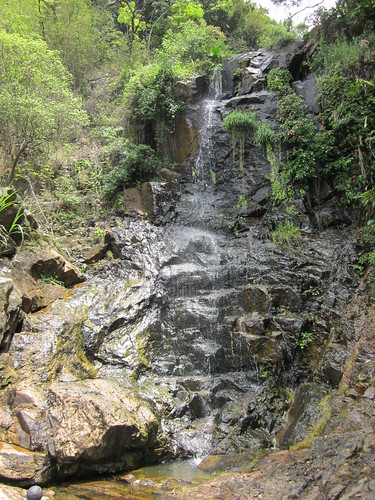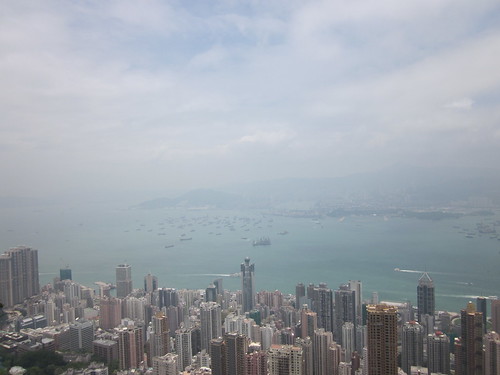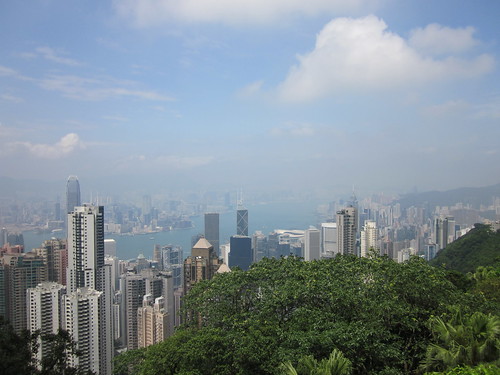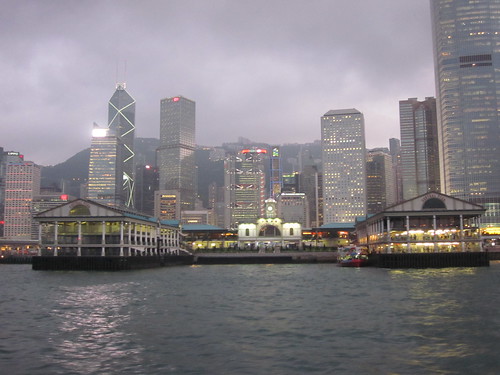“请问,你能帮我们照张相吗?”
I look up from where I’ve been journalling on a bench on the observatory deck of one of the Peak’s shopping centres, as if I haven’t been listening to everything they’ve been saying all along. In part, I haven’t been listening to the details — partly because I can’t understand that much Shanghainese, and partly because I am just drinking in the sounds — but I suppose it still counts as eavesdropping.
I can’t say I’m sorry, though.
A late middle-aged man is proffering a digital camera at me; a woman around the same age and another man, probably in his sixties, are standing behind him by the railing. Behind them is a stunning view of the Pokfulam Reservoir. It’s the first day it’s stopped raining in days and I took the bus up here to get away from the cooped up feeling of being indoors for too many days in a row. They are all smiling at me and I take the camera and do a couple of shots of them.
As I hand the camera back, they ask me, quite naturally, where I’m from. In Canada, I’ve noticed people can take offence to the question, but here, it’s as common a question that passes between strangers as any other, one of the standard queries in the repertoire. Certainly, it’s asked with more sincerity than ‘How are you?’ and no one dashes off without waiting for an equally insincere response.
Or maybe they also want to know because I’m speaking Mandarin without the strong Cantonese accent typical of many Hong Kong residents who have only just started learning the language within the last fourteen years since the handover.
I laugh a little awkwardly, not knowing, as I usually don’t, how exactly to answer, and answering, as I usually do, with where my parents are from: my mother is from Beijing and my father is from Shanghai. It’s the quickest way I can think of to explain all the languages I can then be assumed to speak — and the ones I can’t. Because here, there are many more layers of language and birthplace and living space to explain; many more questions that are asked — that people know to ask — than in Vancouver, one of which is whether I can speak Shanghainese. It is, after all, my father’s first language and following patrilineal tradition, the one I ought to speak best. I laugh again and say one of the few Shanghainese phrases I’ve finally managed to master: ‘Shanghainese is really hard.’ It’s a mistake, I realise, because they think I’m joking and are now pouring out a steady flow of Shanghainese to which I have to shake my head in response, and we switch back into Mandarin — Putonghua, ‘the common language’. Common now because it has become standardised as the lingua franca within the mainland, the language used in educational curricula, in business, in law.
For all that the Han constitute 92% of the Chinese population, the language diversity is intense. There are at least seven different language families within the overarching Chinese umbrella, all fairly unintelligible to one another unless you’ve had practice and experience listening to them. To me, they are as similar and as different as Romance languages are to one another. Having a standardised language has done wonders in quickening communication across otherwise largely divided peoples.
Standardising a language is a double-edged sword, though: alternative accents are scorned, dialects disappear, languages are lost. The different accents and dialects I used to hear in news reports on Chinese channels are hardly present in younger generations of Chinese people. My friends from the mainland, especially the ones who spent most of their lives there, sound quite similar — a testament to the educational system, I suppose.

The Bund, Shanghai
When in Shanghai for the first time last year, I thought, with great eagerness, that here I would hear as much Shanghainese spoken as Cantonese is in Hong Kong. However, I forgot that Cantonese is the official language in Hong Kong and Shanghainese is not an official language at all. Everyone spoke perfectly good Mandarin, without a hint of the Shanghainese pronunciation that my mother used to rage at and instructed me strictly not to pick up from my dad. The only times I heard a snatch of Shanghainese was when a couple of old folks were conversing with their middle-aged offspring. The grandchildren seemed to understand, but didn’t converse in, the old people’s language, preferring to respond in Mandarin and in conversation with each other. In another fifty years, I wonder how many people will be left to speak the language at all?
And while there is nothing seriously wrong with having a common language, it does not feel seriously right, either, to come at the expense of all the others.
I admit it, I’m greedy: I want to keep all the languages we have now; I don’t want over 90% of the world’s languages to be extinct in another half to whole century, or whatever the statistic is. I don’t want to lose all the beautiful sounds that we can’t even imagine until we hear them, all the ingenius phrases people around the world have come up with to express how they feel, think, are. Our different understandings of the world. The skill of learning, from sheer necessity, to listen to one another speak, to discover similarities, to share difference. Of being able to tell, from enough careful hearing, the language and history to which a person belongs. Perhaps it is a freedom, that one can be increasingly anonymous and untraceable in a globalising world, but it is also the sound of severing connection, and I grieve over the impossibility of what I wish.








